|
|
|
|
Products mentioned in this Article
|
|
|
|
|
|
|
|
|
 |
|
|
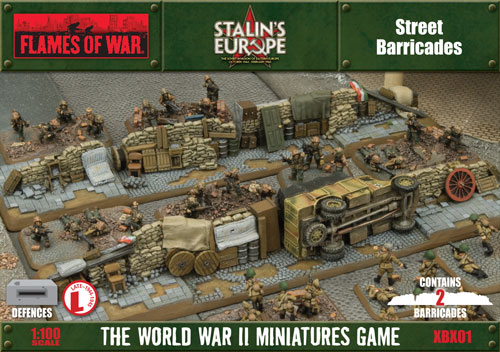 |
Street Barricades (XBX01)
with two street barricades & obstacle inserts.
During the many battles for cities on the Eastern Front the defenders used improvised barricades to block access to the streets and thoroughfares. These were used to slow the momentum of the attackers and as an anchor point for the defence. The barricade would slow or stop any enemy armour, making them vulnerable to attacks from the surrounding buildings.
Check out the Street Barricades in the online store here...
|
A barricade was usually built to act as both an obstacle and as protection for the troops manning it. They took many different forms depending the material available to construct it. Many were made from rubble and stonework salvaged from the surrounding streets and buildings.
|
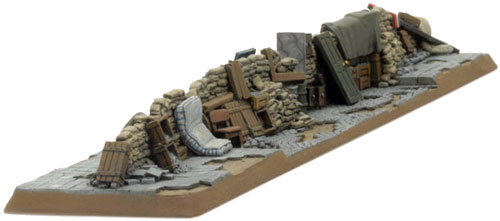 |
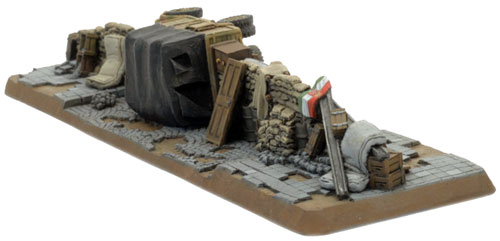 |
Felled lampposts and telegraph poles could also
reinforce them. Sometimes cars, trucks, buses or city trams were used to
build the barricade around. A knocked out tank made a particularly
impressive barricade anchor, providing the defenders plenty of
protection from rifle and machine-gun fire. |
A Street Barricade is a Barrier fortification (see page 209 of the main rulebook).
Crossing a Street Barricade
Street Barricades are Very Difficult Going, but are Impassable to Cavalry and teams with Remote Control Demolition Carriers. This means that only troops on foot and Fully-tracked armoured vehicles can cross them at all, although Fully-tracked vehicles need a Skill test to do so. Overloaded vehicles must re-roll successful Skill tests to cross a Street Barricade.
|
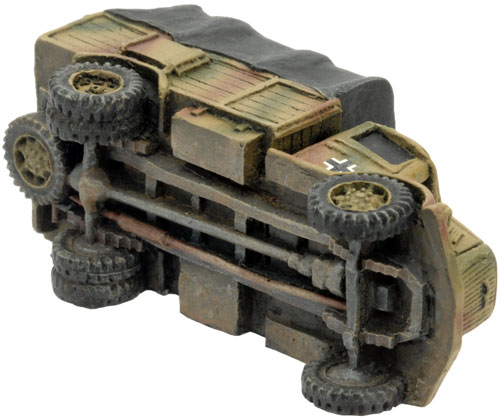
|
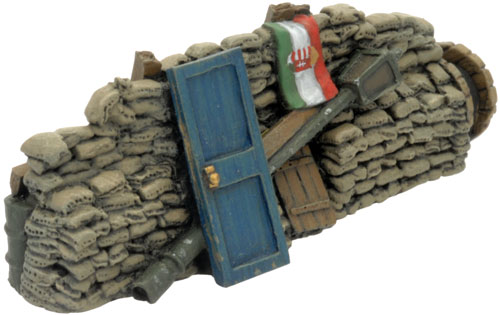 |
A Street Barricade is built high and deep so teams must start the Movement Step adjacent to the barricade to cross it, and must stop their movement on reaching a barricade.
Assaulting teams must start the Assault Step adjacent to the barricade to Assault enemy teams adjacent to the other side of it.
Teams cannot end a Step sitting on a barricade. They must be on one side or the other and clearly either adjacent to the barricade or back from it.
|
Taking Cover behind a Barricade
Street Barricades provide Concealment and Bulletproof Cover against shooting from the other side, but no protection against artillery fire, or aircraft.
|
Gapping a Street Barricade
A Remote-Controlled Demolition Carrier (see page 216 of the rulebook) detonated adjacent to a Street Barricade
makes a Firepower Test using its second Firepower rating to gap the Street Barricade.
Guns rated as Bunker Buster can also gap a Street Barricade. A team must be able to draw a Line of Sight to a Street Barricade and be within 16”/40cm to be able to shoot at it. Unlike normal shooting, teams roll a Skill Test to hit a Barricade. If they hit, make a Firepower Test to gap the Street Barricade.
|
Pioneer teams that are not Pinned Down may gap an adjacent Street Barricade instead of moving. At the end of
the Movement Step the team makes a Skill Test to gap the Street Barricade. Regardless of whether they succeed or not, every team that attempted to gap the Street Barricade counts as having moved.
|
When making a Firepower Test or Skill Test to gap a Street Barricade:
- A successful test will gap the Street Barricade.
- A failed test leaves the Street Barricade totally unharmed.
|
Last Updated On Thursday, March 3, 2011 by Blake at Battlefront
|
|
|